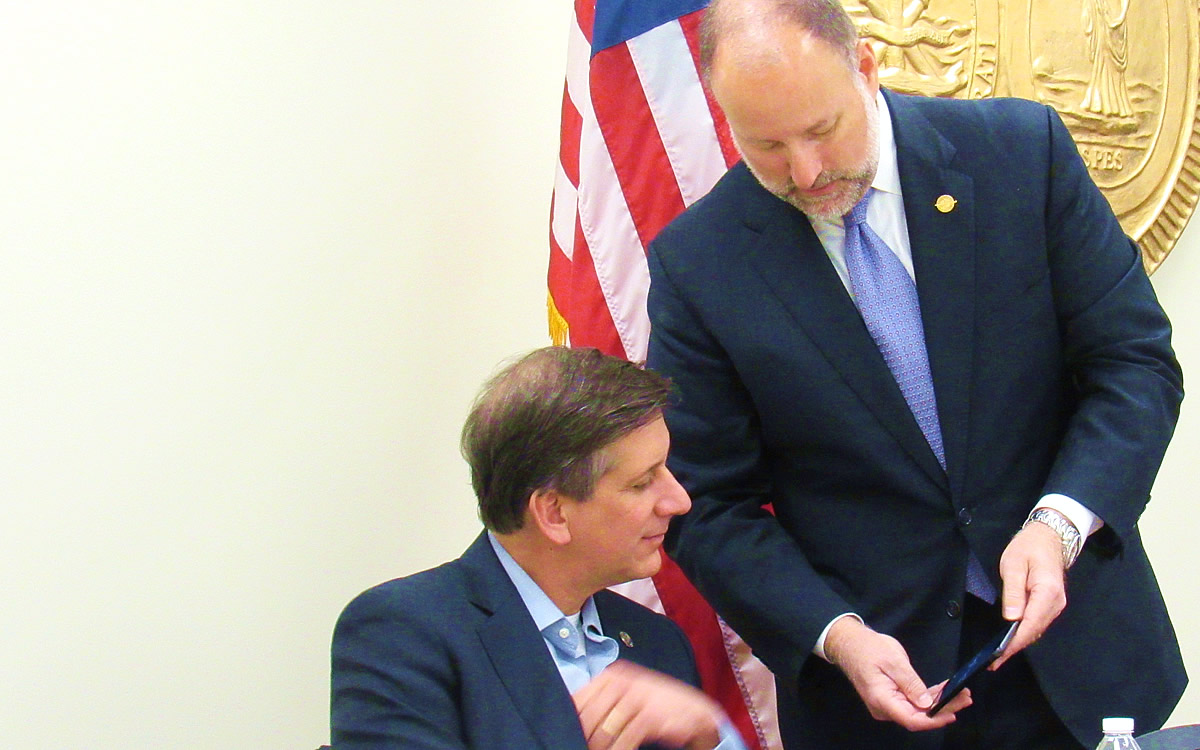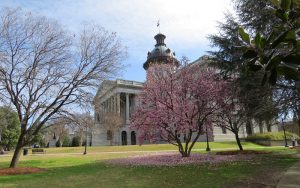
By Lindsay Street, Statehouse correspondent | Among the many unknowns about the coronavirus pandemic, one thing has become clear: the state’s budget is not going to be the $10 billion package passed by the House just 10 days ago.
“We are in new times and the only thing we know is that the financial reality of two weeks ago no longer exists,” Senate Finance Committee member Vincent Sheheen told Statehouse Report Thursday. “Under any circumstance, the big projected ($1.8 billion) surplus is no longer here anymore.”
The Camden Democratic senator’s home county has been hard-hit by the virus in the early days of the outbreak. As of Thursday, Kershaw County had 29 positive cases.
Health officials have reported 81 cases across 17 counties — a six-fold increase over a week’s time.
As uncertainty grows for public health and the economy, the state Senate gave second reading this week to a continuing budget resolution, teeing it up for a single vote in both chambers to keep government lights on after June 30.
But lawmakers want a real, responsive budget. They are grappling with the question of how hard and how long the pandemic will roil the economy and disrupt state revenues.
The S.C. Revenue and Fiscal Affairs Office’s Board of Economic Advisors will meet April 9 to talk about potential impacts. The meeting will provide the results of a financial stress test that will guide the Senate’s budget process.
Threat unknown
Public health precautions have prompted calls for social distancing, working from home and curbing gatherings of people, such as eating in restaurants and going to church. The economic toll is unfolding.
 The S.C. Department of Employment and Workforce reported a 400 percent increase in jobless claims over the past week. The U.S. Labor Department reported Thursday a 30 percent jump in joblessness for the last week — accounting for 281,000 people nationwide who are newly seeking unemployment benefits.
The S.C. Department of Employment and Workforce reported a 400 percent increase in jobless claims over the past week. The U.S. Labor Department reported Thursday a 30 percent jump in joblessness for the last week — accounting for 281,000 people nationwide who are newly seeking unemployment benefits.
Tourism and manufacturing, two of the state’s largest employers, are expected to be hit. Volvo announced it would temporarily shutter its Berkeley County plant until mid-April, although BMW pledged to remain open for the time being.
“If the disruption in world trade continues to reduce imports and exports, manufacturing states that are more reliant on the global economy for raw materials and parts could be particularly vulnerable. If travel continues to decline … states with tourism-based economies may feel the impact especially hard,” Jeff Chapman, director of the state fiscal health project at The Pew Charitable Trusts, penned in an analysis this week.
How much the economy will suffer — and how state revenues are impacted — will depend on how long public health practices will curb business and jobs, economists say. Some economists have even floated the possibility of a depression as some epidemiological models show a year-long need for social distancing to keep from overwhelming the nation’s hospital systems.
Surplus provides a buffer
RFA Executive Director Frank Rainwater said this week that he expects the state’s projected surplus from the past two budget cycles — roughly $600 million — to buffer losses during March and April.
“South Carolina is in good shape to weather a downturn. The question being just how strong that downturn is,” he said, adding that the state could still see positive growth in revenues. “I’m not seeing anything to think we are at risk of losing all that surplus at this point.”
But downturns have a multiplier effect on state budgets, Pew’s Chapman said. In addition to hitting the state’s largest revenue source (individual income tax), more people will likely apply for unemployment benefits and possibly Medicaid.
“Revenue is going to be declining and costs are going to be rising at the same time,” Chapman told Statehouse Report, adding that this comes at a time where states are just beginning to return to normal spending levels following the 2008 recession.
Summerville Republican Sen. Sean Bennett, a member of the Senate Finance Committee, said he doesn’t expect state revenues to be hit like the recent Great Recession, where lawmakers had to come in mid-year and address shortfalls with cuts.
“This is a short-term thing, this whole coronavirus economic downturn is not a structural economic problem,” Bennett said.
Budgeting in the time of coronavirus
 Most lawmakers agree that, aside from the public health response and the budget, the session is over for any big issue. That means the fate of Santee Cooper will be decided at a later time, possibly in a special session later this year. It also means that the perennial debate on abortion will likely wait.
Most lawmakers agree that, aside from the public health response and the budget, the session is over for any big issue. That means the fate of Santee Cooper will be decided at a later time, possibly in a special session later this year. It also means that the perennial debate on abortion will likely wait.
The session is scheduled to end mid-May, and the fiscal year ends June 30.
The soonest that senators are expected to begin budget-writing is after the April 9 projections. That could mean the budget won’t be completed until May or later. Then it must go to the House for approval before going to the governor’s desk.
“We’re going to have to approach the budget differently than we ever have before,” Sheheen said.
Lawmakers may choose to make some funding contingent, or could leave the door open to address spending in the off-session.
“This is not a one-off where you do something and you’re done,” Sheheen said. “We have to be ready and nimble to write a budget on the circumstances as we know it then and revisit it as the weeks go by.”
Bennett said a late budget is not out of the question. That means it won’t be passed until May or possibly June.
“In the best-case scenario, we are looking at a late budget. In the worst-case scenario, we may operate under a continuing resolution for a short period of time,” he said. “We don’t want to rush a budget through and not be accurate.”
- Have a comment? Send to: feedback@statehousereport.com
















 We Can Do Better, South Carolina!
We Can Do Better, South Carolina!
Pingback: Charleston Currents – NEWS BRIEFS: Small businesses can apply for disaster loans for capital